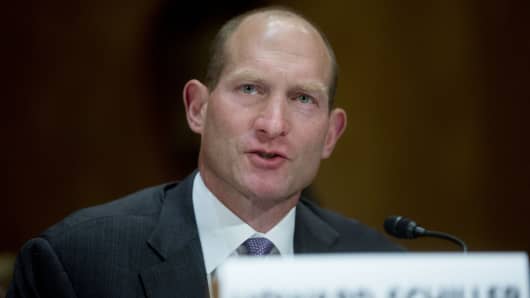The past several months have been extraordinarily challenging for our company, Valeant Pharmaceuticals. We've been attacked by short sellers, criticized by many peers in our own industry, and subjected to intense public scrutiny. Our stock price plummeted 70 percent before partially recovering. But we believe the experience will make us a better company.
Valeant has grown quickly over the last seven years, expanding from a small, sleepy business to one with more than $10 billion in sales in 100 countries. Along the way, we've often challenged industry convention. Partly because of that, we've earned our share of criticism. Some of that has been deserved, but much of it relies on misperceptions about who we are.
For example, citing our large number of acquisitions, some have called us a "hedge fund." Nothing could be further from the truth. Valeant today is a multinational pharmaceutical company with strong organic growth, 21,000 employees, and 16 U.S. manufacturing facilities. In the U.S., we are a dermatology, gastrointestinal, ophthalmology and consumer health-care company.
We invest heavily in research and development, employing scientists, doctors, and other researchers in high-paying jobs. We have more than 200 active R&D programs at 43 different facilities, and in the past two years, we've launched 41 new prescription drugs, generic drugs and medical devices in the United States. This year we will spend about 8 percent of our U.S. pharmaceutical revenue on R&D and our record has consistently shown that we produce more with less than other pharmaceutical companies.
We also support R&D through our acquisitions, creating a flow of capital to small startups and encouraging research, risk-taking and innovation. This is the same model that has supercharged the tech industry in recent years, and, notably, is also being pursued by many of our larger rivals in the pharmaceutical industry.
Just as we have a responsibility to correct misperceptions about our company, however, we also must listen to criticism and respond when it's appropriate. We are doing that, making changes in how we operate in a number of areas.
For example, last month we announced a new partnership with Walgreens that will deliver some of our most popular prescription drugs to patients at lower prices. In addition to cutting the prices of our branded dermatological and ophthalmological prescription medicines by an average of 10 percent within the next six to nine months, we're going to begin offering many of our other branded drugs at generic prices. That will lower prices for those drugs by an average of 50 percent, and in some cases as much as 95 percent.
We've also begun offering volume-based discounts for our hospital-administered drugs with discounts up to 30 percent, including two for which our pricing has been particularly criticized, Nitropress and Isuprel. And we're increasing our already large investment in patient co-pay programs that help patients with commercial insurance lower the out-of-pocket costs they pay to get the drugs they need.
We've tried to build a different kind of company over the past seven years, one that can deliver life-changing medicines to patients with greater speed and efficiency. We have not gotten everything right. But our model is succeeding in meeting our core mission – speeding up the delivery of innovative products to the doctors who prescribe them and the patients who need them. Our job now is to maintain our commitment to patients, correct our missteps, and move this company forward.
Commentary by Robert Ingram, the interim chairman of Valeant Pharmaceuticals International, Inc., and Howard Schiller, Valeant's interim CEO.
For more insight from CNBC contributors, follow @CNBCopinion on Twitter.






